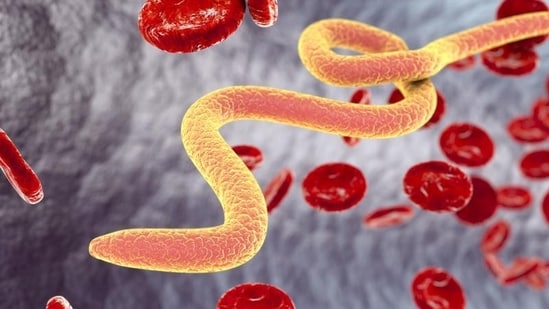Infection
World’s first case of live parasitic worm found in Australian woman’s brain: ‘Alive and wriggling’
Researchers believe that the woman contracted the infection while gathering edible shrubs near her residence in Australia’s New South Wales.
In the world’s first case, an eight cm live worm was pulled out from the brain of a 64-year-old Australian woman during a surgery, the doctors said.
The woman had been admitted to the Australian National University (ANU) and Canberra Hospital, where after suffering from several health issues for a long time.
The doctors were shocked to find a Ophidascaris robertsi roundworm, “alive and wriggling” in her brain, as previously the parasite had been known to inhabit carpet python snakes and kangaroos. The worm’s larvae were also suspected to have infected the woman’s other organs such as her lungs and liver.
Also Read| Worm infection in kids: Causes, symptoms, preventive tips by doctors, treatment
“This is the first-ever human case of Ophidascaris to be described in the world,” said one of the doctors at the hospital and infectious disease expert Sanjaya Senanayake. “To our knowledge, this is also the first case to involve the brain of any mammalian species, human or otherwise.”
‘Signs of forgetfulness and depression’
The patient, hailing from New South Wales, was first admitted to a local hospital in 2021 after complaints of abdominal pain and diarrhoea, among other issues. By 2022, she showed signs of forgetfulness and depression, prompting a referral to the Canberra hospital. An MRI scan of her brain revealed abnormalities requiring surgery. The parasite’s presence was confirmed via DNA testing following the brain scan, the doctors said.
Also Read| Intestinal parasites: Signs and symptoms; foods you must eat to get rid of worms
Researchers believe that the woman contracted the infection while gathering edible shrubs near her residence. These shrubs were likely contaminated with parasitic larvae shed in snake faeces.
The case marked the first such infection in the world but the Senanayake believed it was “likely that other cases will be recognised in coming years”.
The findings were published in the journal Emerging Infectious Diseases.
As per the US Centres for Disease Control and Prevention, more than 6 out of every 10 known infectious diseases in people can be spread from animals. It added that three out of every four new or emerging infectious diseases in people come from animals.


